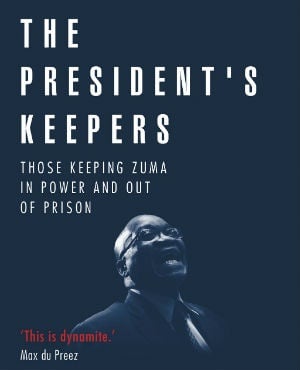
Jacques Pauw's book, The President's Keepers, is an honest and tragic revelation of the depth of the rot in the criminal justice system in post-apartheid South Africa.
Reading through the book, one is left with a melancholic feeling that if South Africa is to move forward in nation-building and democratic consolidation, we have to acknowledge that we have failed dismally in the past two decades.
What needs to take place is to rebuild the integrity of state institutions from scratch, particularly the crime-fighting institutions of the criminal justice system. What Pauw reveals goes beyond mere corruption, because corruption entails some level of sophistication in carrying out impropriety. Pauw shows brazen looting and infiltration of the system by criminals. Most of the institutions that are directly in the purview of the executive seem to be completely compromised.
Those who have studied corruption in post-colonial Africa and its impact on state capacity would be shocked to realise that Pauw's book paints a picture of South Africa that makes what Mobutu Sese Seko did in Zaire look like a picnic.
The current political leadership in South Africa is presiding upon an episode of racketeering and brazen criminality that will take many years to address. When speaking to police officers carrying out policing duties, one is confronted with a feeling of helplessness and lack of confidence in leadership. The nation is becoming numb and there are those who are willing to politicise the matter and focus on the messenger, instead of confronting the sad picture painted in the book. At times, even government officials should come to realise that there is a limit to what can be achieved through public relations stunts; and at the end the actual problem at hand will have to be confronted and be resolved.
The attitude of government towards Pauw's revelations is to wield state power and intimidate the author as he has had access to state secrets in the writing of his book. The level and depth of access that Pauw has had, also reveals that there are some people in government – I call them responsible public servants – who still have a sense of right and wrong. Those are the heroes who risk their lives to reveal the truth about the system. Their message is that South Africa is a house of cards which might collapse at any point in time. What institutions such as the State Security Agency (SSA) and South African Revenue Services (SARS) seek to do, is to intimidate the author and delegitimise the information in the book. This exercise is untenable from the word go. The book is already out there and it is receiving global attention.
Further, it will be very difficult for the SSA and SARS to go to court about the book without having to touch on the truth of the matter at hand. This is where the principle of public interest comes in: if the book is factually correct, publicising such information is certainly in the public interest. The courts will also not engage in a fruitless exercise of trying to achieve the unachievable; and stopping the book which is already widely in the hands of many people.
The only way the government can engage with the content of the book through the court system is to claim that it is full of lies and therefore defamatory. It appears Pauw is ready to further substantiate his case. He repeatedly states in the book that there just isn’t "enough space to put all in the book". This means that there is still more dirt on the government, and the additional instalment might come out if government goes to court.
If I were in government, I would totally abandon the standard bullying bull@#$#t tactics of threatening to go to court. The best way for government is to cut its PR budget on this and engage with the content of the book by instituting proper investigations into the allegations made by Pauw. Alas, the standard response from government towards allegations of impropriety is to threaten the messenger. This is will only make things worse and will further undermine the integrity of government.
Disclaimer: News24 encourages freedom of speech and the expression of diverse views. The views of columnists published on News24 are therefore their own and do not necessarily represent the views of News24.




 Publications
Publications
 Partners
Partners

























